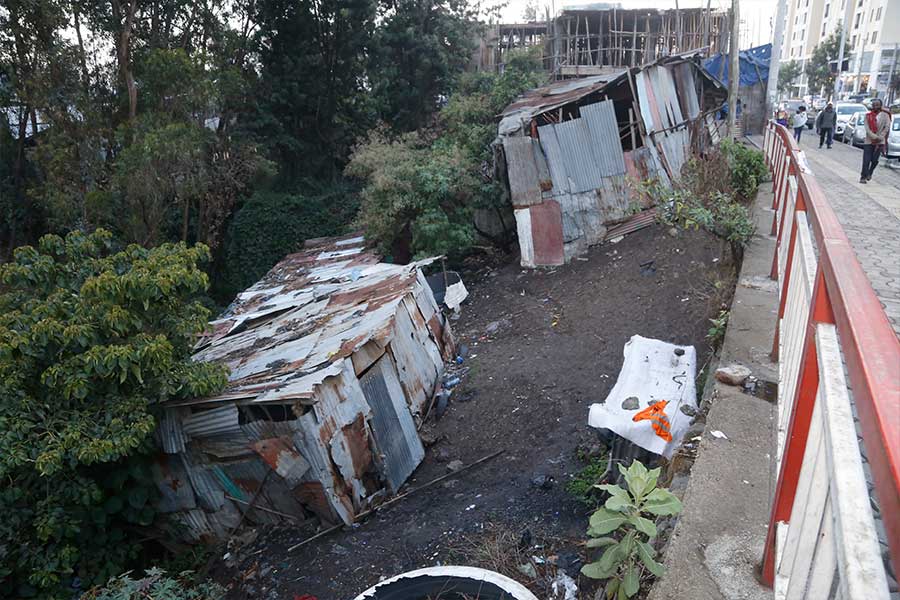
In-Picture | Nov 16,2019
Jan 14 , 2023
By Eden Sahle
I have never met anyone who appreciated court proceedings. It has become a traumatic experience from complex to simple cases and non-trial dispositions as files spend months to years on the shelves waiting for resolution.
The lack of standards for the timely resolution of cases aggravates the problem with no consequences for the delay. The time cases are handled is critical to effectuating the accused's right to a speedy trial and keeping the interests of the public, including victims and witnesses. It also ensures the effective utilisation of the country's limited resources.
From the commencement of cases to their conclusion, so much time is wasted that has nothing to do with the court process.
It is understandable that criminal cases have lengthy procedures. Nevertheless, the absence of a system that monitors the courts' performance and other administrative hurdles creates unnecessary delays. The under-compensated judges are forced to perform beyond their capacity handling several cases daily, affecting both the accused and the victims beyond themselves.
In many cases, an individual charged with an offence will experience significant restrictions on their rights and liberties. The plaintiff may face prohibitions on their ability to drive, restrictions on who they can speak with, and where they can reside that may lead to imprisonment, all while awaiting the conclusion of their charges. Not only do these delays significantly frustrate the individual if she is innocent, but they can also result in prejudice.
Last month, a foreign friend who resides abroad went through a similar situation with the frustrating court system. His company manager took his car to Addis Abeba Transport Bureau to get the local sticker called Bolo. Unfortunately, the manager forgot to paste the Bolo on the windscreen to prove the car's legibility to be driven in the streets for a year. Without realising the situation, he was found driving the vehicle with no sticker on the windscreen.
My friend ended up before the court. He admitted the mistake and was ready to pay the fine after showing the car's annual evaluation from the Bureau. He presumed the decision would take a few minutes, as it did "back home". It took him half a month.
With the tight schedule, he explained the matter to the judge but was threatened to face jail time if he did not meet the requirements. His case was delayed for lack of an interpreter in the court. Even if there was, the proceedings required trials to be held in the Amharic language. The judge postponed the case for another 10 days, citing this reason. Several days later, his case was handled by another judge who openly criticised his peer for wasting the court's time. He got a 1,000 Br fine, and the case was finally closed.
Such resource and time-wasting actions are frequent in courthouses. A case that can be ruled within a few minutes or days takes several days or months. The destructive delayed system of the court proceeding has become common. The system angers the public while costing the country more than it should. Most people have faith in court systems up to the point of dealing with the system. The events are so jarring, frustrating and time-wasting that people are discouraged even to be witnesses in the criminal case they witnessed first-hand.
Hearings take an odd turn that wastes time most of the time. Most assume better systems will be in place once the long-awaited economic development is achieved. They ignore that development only comes with a diligent role-play of responsibility. Poverty has little to do with this, and so is the commitment to take a step forward.
We have lived by accepting inefficiency as the norm at the expense of our time, finance and health. None of these would have been familiar if we all had taken our responsibilities seriously.
Most court benches have much to learn from first-instance court judges, such as the ones at Bole district. They have implemented an efficient system to eliminate delays and speedily adjudicate cases. They have organised efficient and informed people at the registrars who pass on issues to the judge with every relevant document to enable a swift decision.
The efficient system not only reduces the stress of judges but also creates trust from the public. When justice is served well, crimes and offences rate relinquish. It can change the public's perception of courts with a positive outlook.
Although courts are seen to adjudicate high-profile crimes that outraged the public quickly, it has not quite lived up to the expectation of other criminal, civil and minor offence cases. Delaying proceedings is not economical. It does not look good when senior judges perform much less than the amateur leveraging on the quick resolve to cases.
PUBLISHED ON
Jan 14,2023 [ VOL
23 , NO
1185]

In-Picture | Nov 16,2019

Fortune News | Apr 27,2025

Fortune News | May 14,2022

Obituary | Jul 11,2021

Sunday with Eden | Feb 11,2023

Sunday with Eden | Jul 07,2024

Advertorials | Apr 08,2024

Commentaries | May 06,2023


Radar | Jun 26,2021

Photo Gallery | 173884 Views | May 06,2019

Photo Gallery | 164112 Views | Apr 26,2019

Photo Gallery | 154190 Views | Oct 06,2021

My Opinion | 136590 Views | Aug 14,2021
Editorial | Oct 11,2025

Dec 22 , 2024 . By TIZITA SHEWAFERAW
Charged with transforming colossal state-owned enterprises into modern and competitiv...

Aug 18 , 2024 . By AKSAH ITALO
Although predictable Yonas Zerihun's job in the ride-hailing service is not immune to...

Jul 28 , 2024 . By TIZITA SHEWAFERAW
Unhabitual, perhaps too many, Samuel Gebreyohannes, 38, used to occasionally enjoy a couple of beers at breakfast. However, he recently swit...

Jul 13 , 2024 . By AKSAH ITALO
Investors who rely on tractors, trucks, and field vehicles for commuting, transporting commodities, and f...

Oct 11 , 2025
Ladislas Farago, a roving Associated Press (AP) correspondent, arrived in Ethiopia in...

Oct 4 , 2025
Eyob Tekalegn (PhD) had been in the Governor's chair for only weeks when, on Septembe...

Sep 27 , 2025
Four years into an experiment with “shock therapy” in education, the national moo...

Sep 20 , 2025
Getachew Reda's return to the national stage was always going to stir attention. Once...

Oct 12 , 2025
Tomato prices in Addis Abeba have surged to unprecedented levels, with retail stands charging between 85 Br and 140 Br a kilo, nearly triple...

Oct 12 , 2025 . By BEZAWIT HULUAGER
A sweeping change in the vehicle licensing system has tilted the scales in favour of electric vehicle (EV...

Oct 12 , 2025 . By NAHOM AYELE
A simmering dispute between the legal profession and the federal government is nearing a breaking point,...

Oct 12 , 2025 . By NAHOM AYELE
A violent storm that ripped through the flower belt of Bishoftu (Debreziet), 45Km east of the capital, in...